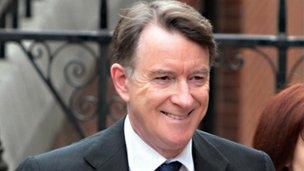Leveson Inquiry: 'No pact with Murdoch' - Mandelson
- Published

On his reputation for spin Lord Mandelson described himself as "a lightning conductor for Blair"
Lord Mandelson has denied there was a "Faustian pact" between Labour and Rupert Murdoch's News International before the 1997 general election.
He told the Leveson Inquiry that Tony Blair sought to "reassure" the Sun over issues such as Europe.
But he insisted there was no deal involving commercial concessions in return for support from the newspapers.
Earlier, former minister Tessa Jowell said having her phone hacked made her feel she was going "slightly mad".
Commons Speaker John Bercow has said MPs will debate the findings of the select committee report into phone hacking on Tuesday.
Lord Mandelson said <link> <caption>in his written statement:</caption> <url href="http://www.levesoninquiry.org.uk/wp-content/uploads/2012/05/Witness-Statement-of-Lord-Mandelson.pdf" platform="highweb"/> </link> "I reject the view that, under either Mr Blair or Mr Brown, some sort of Faustian pact was forged between the government and Rupert Murdoch involving commercial concessions to him in return for support from his newspapers."
But he went on: "It is also arguably the case, however, that personal relationships between Mr Blair, Mr Brown and Rupert Murdoch became closer than was wise in view of the adverse inference drawn from the number of meetings and contacts they had.
"The same, I am sure, can be said for Mr Cameron and, no doubt, his predecessors."
'Taken out and shot'
Mr Mandelson also told the inquiry he would treat communications between Fred Michel, the News International lobbyist, and Culture Secretary Jeremy Hunt with "some scepticism".
On Mr Hunt's advisor Adam Smith's communications with Mr Michel he said: "What on earth was a temporary civil servant, a special adviser to a secretary of state, doing texting like that and exchanging messages and information with a corporate lobbyist?
"If they'd have been in the Department for Business they would have been taken out and shot, in fact they would not have got to that stage," he said.
Lord Mandelson described former News International chief executive Rebekah Brooks as someone known for her "persistence, charm and manipulative skills" - adding: "Although some people might say that's rich coming from me."
"She's very good at keeping in touch. I mean, obviously famously by text but in other ways. She doesn't hold back," he said.
He added that Ms Brooks had asked whether Tom Watson MP could be removed from the media select committee.
Lord Mandelson said he called The Sun "chumps" for backing the Tories in 2009 because he thought the paper's readers would find it "incredible".
He said Rupert Murdoch had been "quite agitated" that the government had "declared war" on his company, as Gordon Brown is alleged to have threatened after the Sun switched allegiance.
On his reputation for spin he said: "I started off in the 1980s as rough, tough, robust defender of my party. A lightning conductor for Blair, then picked over by Blair's neighbour."
'Surprised and alarmed'
Earlier, former culture secretary Mrs Jowell said she "kept on reading stories and could not understand where they had come from".
Lord Mandelson said some people might think his calling Rebekah Brooks manipulative is rich coming from him.
"You feel as if you are going slightly mad and you adopt a permanent stance as if you are being followed."
Mrs Jowell told the inquiry into press standards that the police told her that her voicemail had been hacked into "on 28 or 29 occasions" in May 2006 alone, around the time she split from her husband David Mills.
She said she subsequently learned her phone had been hacked into much more often.
In 2011, Mrs Jowell accepted £200,000 in damages from News Group Newspapers after her phone was hacked.
Mrs Jowell said stories were published about her that could only have been derived from her voicemails in papers other than News International, naming the Daily Mail, Evening Standard and Sunday Times.
Later asked by the Evening Standard to clarify her remarks she said she had not accused the paper of hacking.
"I was asked a more general question about other newspapers and I said that at the time of this period of intense media interest, I was aware that newspapers including the Evening Standard had written stories which displayed a level of great personal knowledge which surprised me and alarmed me," she said.
Met Police officer Det Ch Supt Keith Surtees had previously told the inquiry Mrs Jowell declined to help with the police investigation.
But Mrs Jowell said she was "absolutely clear" that she had sought clarification from the police about what steps she should take next and expressed her willingness to help with their investigation.
Mrs Jowell said Prime Minister Tony Blair had given her an "absolute assurance" no deal had been done with Rupert Murdoch when she was appointed Culture, Media and Sport Secretary, a role she held from 2001 to 2007.
She said that within days of her appointment she told Mr Blair not to meet the parties involved while she was working on legislation relating to cross-media ownership.
Questioned by Lord Justice Leveson as to why she felt the need to warn the prime minister, Mrs Jowell said she was ensuring the meetings she held on the proposals before her would not be "undermined" by people approaching No 10 directly.